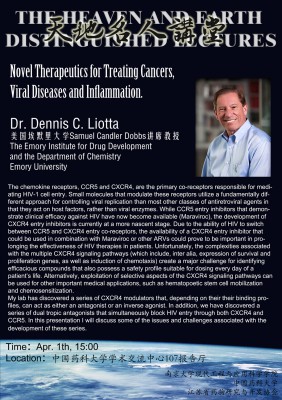报告时间:4月1日下午15:00
报告地点:中国药科大学玄武校区学术交流中心107报告厅
报告题目:Novel Therapeutics for Treating Cancers, Viral Diseases and Inflammation
报告人:Dr. Dennis C. Liotta
美国埃默里大学Samuel Candler Dobbs讲席教授
美国埃默里大学艾滋病研究中心副主任
美国埃默里大学药物研发院院长
美国化学会药物化学快报主编
美国化学会会士,AAAS会士
报告摘要:
The chemokine receptors, CCR5 and CXCR4, are the primary co-receptors responsible for mediating HIV-1 cell entry. Small molecules that modulate these receptors utilize a fundamentally different approach for controlling viral replication than most other classes of antiretroviral agents in that they act on host factors, rather than viral enzymes. While CCR5 entry inhibitors that demonstrate clinical efficacy against HIV have now become available (Maraviroc), the development of CXCR4 entry inhibitors is currently at a more nascent stage. Due to the ability of HIV to switch between CCR5 and CXCR4 entry co-receptors, the availability of a CXCR4 entry inhibitor that could be used in combination with Maraviroc or other ARVs could prove to be important in prolonging the effectiveness of HIV therapies in patients. Unfortunately, the complexities associated with the multiple CXCR4 signaling pathways (which include, inter alia, expression of survival and proliferation genes, as well as induction of chemotaxis) create a major challenge for identifying efficacious compounds that also possess a safety profile suitable for dosing every day of a patient’s life. Alternatively, exploitation of selective aspects of the CXCR4 signaling pathways can be used for other important medical applications, such as hematopoetic stem cell mobilization and chemosensitization.
My lab has discovered a series of CXCR4 modulators that, depending on their their binding profiles, can act as either an antagonist or an inverse agonist. In addition, we have discovered a series of dual tropic antagonists that simultaneously block HIV entry through both CXCR4 and CCR5. In this presentation I will discuss some of the issues and challenges associated with the development of these series.
欢迎本感兴趣的同学和老师们参加!



